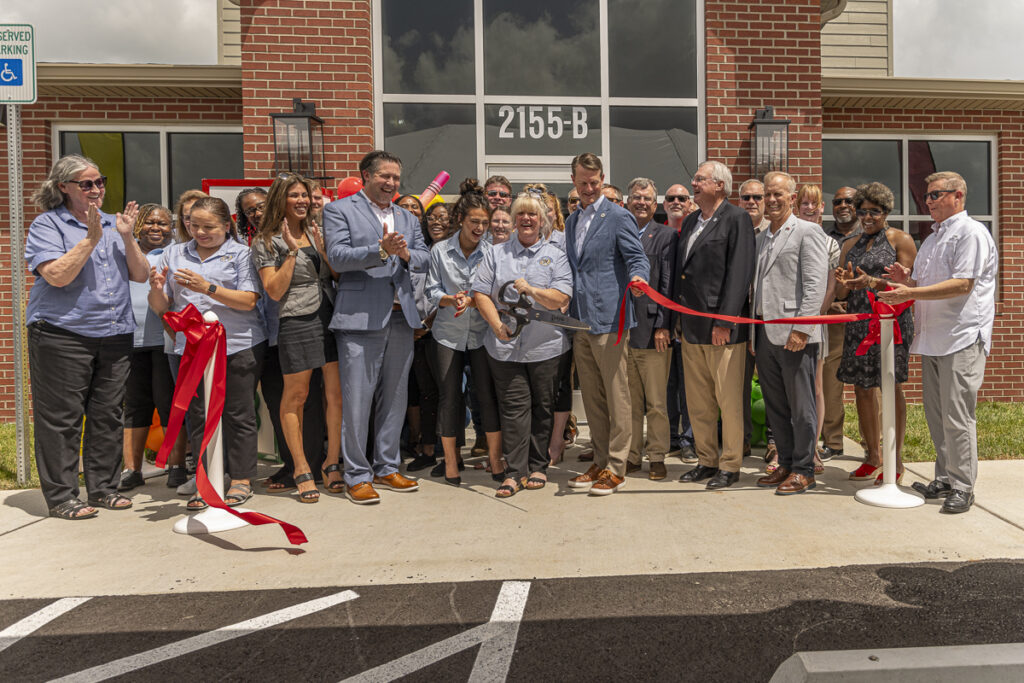In a groundbreaking move, the Clarksville-Montgomery County Industrial Development Board (IDB) has leveraged innovative economic tools to address a critical workforce need: childcare.
This initiative not only supports local businesses but also sets a precedent for how communities can tackle the intertwined challenges of economic development and early childhood education.
The Industrial Park Childcare Solution
The IDB, established in 1963, has long been a driving force behind Clarksville-Montgomery County’s economic growth. Recently, they’ve taken a novel approach to support the approximately 40 businesses and 15,000 employees in their industrial park by attracting a large-scale childcare facility.
The Innovative Approach
The IDB issued a Request for Proposal (RFP) for a childcare operator to build and run a new facility within the industrial park. The winning proposal was submitted by The Youth Academy, and committed to provide 800 full-time childcare slots, with half of those offered at a 15% discount to industrial park employees and active-duty military personnel.
The groundbreaking ceremony for this transformative project took place in August 2024, marking a significant milestone for the community
To my knowledge, this is the nation’s first public-private partnership between an IDB and a childcare owner/operator – and likely the first ever use of the PILOT tool to create the necessary incentive to make the deal work,
Josh Ward, Executive Director of the IDB.

The Youth Academy at the Industrial Park will operate during the hours of 5 a.m. to midnight – with the nontraditional hours being a crucial benefit to families with parents working first and second shifts. Furthermore, they are committed to high quality in all their early childhood programs, including a private kindergarten program certified through the Tennessee Department of Education. Beyond preschool age childcare and kindergarten, they are also offering before- and after-school and summer camp services for the school age children. They also offer an array of amenities — including swimming pools!
Stuart McWhorter, Commissioner of the Tennessee Department of Economic and Community Development, praised the project:
This is a great example of how a community can come together working with industry,” McWhorter said. He also said the effort to open the center is an example to other counties of a way to step “out of the box” and make projects like the Montgomery County effort happen.
The project is an economic accelerator in many ways. Not only does it support workforce attraction and retention, the offer of discounted childcare also helps attract new businesses – and new jobs — to Montgomery County.
To make the project work, the IDB utilized two powerful economic incentive tools:
- Land Donation: The IDB leased a parcel of land to the childcare operator for a nominal $1 per year, with ownership transferring after a decade. With the rezoning to commercial property, that land value has increased to $8-10 million.
- Payment In Lieu of Taxes (PILOT): A 10-year property tax abatement was granted, significantly reducing the operator’s tax burden.
Understanding PILOTs
Payment In Lieu of Taxes (PILOTs) are a crucial economic development tool in Tennessee, offering partial, temporary reductions in real and/or tangible personal property taxes. Typically used to encourage business location, expansion, job creation, and other community-beneficial activities, PILOTs have been a staple in Tennessee’s economic toolkit since the 1980s.
PILOT Impact of the Childcare Project
In addition to the value of the land donation as an economic incentive, the 10-year PILOT for this project will result in significant tax savings for The Youth Academy thus helping offset the significant multimillion dollar investment it made to build the facility.
On the flip side, a property that was not generating any tax revenue prior to this project will now add millions of dollars in future tax payments to Montgomery County from The Youth Academy. Property taxes help pay for local public schools and other important government functions.
Further, the project has created 130 new jobs in the community!
The chart below roughly illustrates the tax savings to The Youth Academy and tax revenues generated during the 10-year PILOT.
| Tax Type | Average Annual Taxes Abated | Average Annual Taxes Paid | ||
| Land | $95,680 | 100% | $0 | 0% |
| Buildings | $65,780 | 55% | $53,820 | 45% |
| Personal Property | $2,228 | 66% | $1,154 | 34% |
| Total | $163,688 | 75% | $54,974 | 25% |
After the 10-year PILOT, there are no further tax abatements, and tax payments to Montgomery County increase to an average of roughly $216,895 annually.
The PILOT allows the childcare facility to establish itself with reduced financial pressure, making it more viable in the long term. And there’s accountability built in — The PILOT has a mechanism to ensure all of The Youth Academy’s commitments are met such as childcare hours of operation, discounts for industrial park employees, etc. In short, tax benefits would be revoked if The Youth Academy does not comply with its commitments.
We’re so thrilled to become a partner to the businesses and employees in the industrial park. It would not have been possible for us to make the investment without the PILOT and land contribution. Child care and early learning programs have slim operating margins industry-wide, and this deal made all the difference in making it work for us financially and to support our community.
Hope Patonis, Owner of The Youth Academy
Broader Implications
This innovative use of economic development tools for childcare provision has far-reaching implications:
- Workforce Support: By addressing childcare needs, businesses in the industrial park can attract and retain employees more effectively.
- Early Childhood Education: The facility increases access to quality early education, crucial for child development and future workforce preparation.
- Economic Growth: The project demonstrates how addressing social needs can directly contribute to economic development.
Josh Ward highlighted the project’s potential impact:
This childcare center will be a beacon of hope for many families in our community. It’s not just about providing a service; it’s about investing in our future workforce and making Montgomery County an even better place to live and work
Future Possibilities for PILOTS as Incentives for Investments in Chiidcare
The success of this project opens doors for similar initiatives across Tennessee.
On the supply side, IDBs could create PILOT programs specifically designed to encourage the creation of child care and early childhood education facilities. For example, there could be incentives established for employers and developers to add childcare to new or existing office buildings or apartment complexes. These PILOTs could be tailored to address acute child care shortages such as locations in child care deserts, infant-toddler care, or nontraditional hours of operation.
On the demand side, IDBs could consider encouraging or even requiring PILOT recipients to offer child care benefits, such as on-site child care or a dollar per child allowance for enrolment in specified child care and early learning programs.
The Clarksville-Montgomery County IDB’s innovative approach serves as a compelling case study in how economic development tools can be creatively applied to address critical community needs. By bridging the gap between business interests and social services, they’ve created a model that could revolutionize how communities approach both economic development and early childhood care and education.





